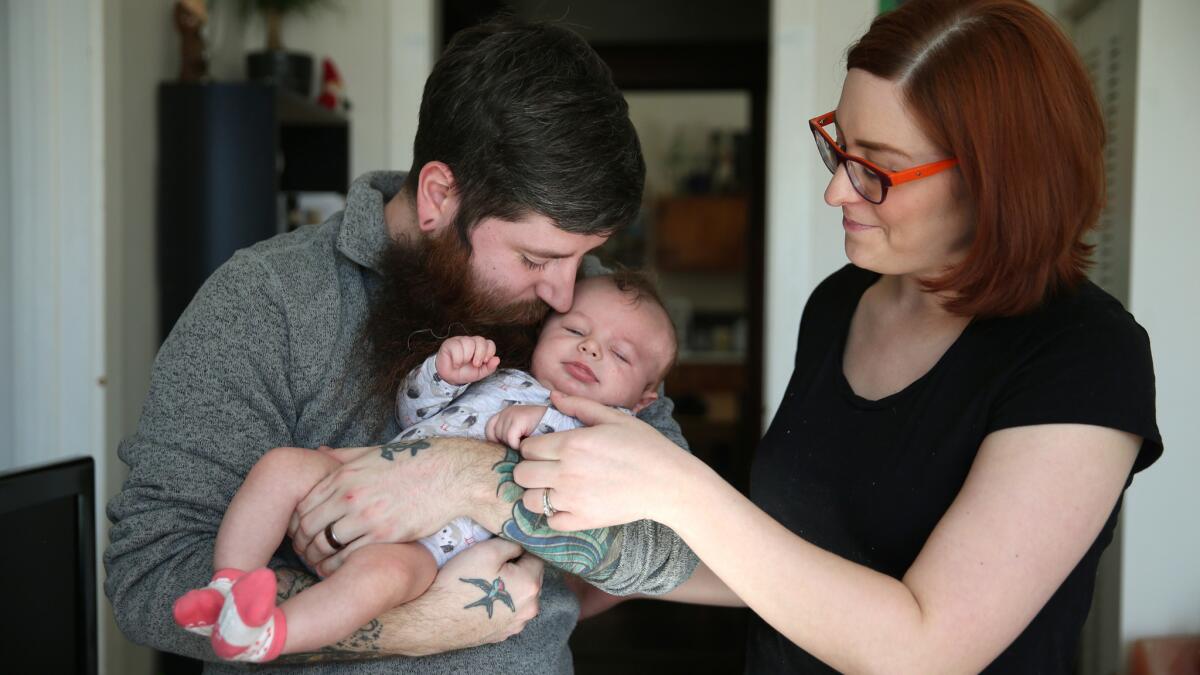Chicago leads U.S. in residency loss as population drops for second year in a row

- Share via
Reporting from CHICAGO — Patrice Bedford had never questioned raising her baby in Chicago.
But on a springtime stroll during the first trimester of her pregnancy last year, a heightened sense of smell — piqued by pungent neighborhood odors — made her view the city differently.
The city’s expensive, she said. Public schools face an unfolding financial crisis, and the violence is “terrifying and frightening” to a parent-to-be. It didn’t take long for Bedford, 28, to realize it was time to pack up and leave her home in Chicago’s Roscoe Village neighborhood.
She, her husband and their son, now 6 weeks old, are preparing to move to Denver this summer.
“We’ve been to Colorado before and visited so many times, and just remembered how astonishingly clean and how fresh the air was and easy to breathe,” said Bedford, who has lived in Chicago for five years. “I felt like I couldn’t breathe anymore in the city.”
Of the country’s 10 largest cities, the Chicago metropolitan statistical area was the only one to drop in population between 2015 and 2016. The region, defined by the U.S. Census Bureau, includes the city and suburbs and extends into Wisconsin and Indiana.
The Chicago metropolitan area as a whole lost 19,570 residents in 2016, registering the greatest loss of any metropolitan area in the country. It’s the area’s second consecutive year of population loss: In 2015, the region saw its first decline since at least 1990, losing 11,324 people.
By most estimates, the Chicago area’s population will continue to decline in the coming years. Over the past year, the Chicago Tribune surveyed dozens of former residents who’ve packed up in recent years and they cited a variety of reasons: high taxes, the state budget stalemate, crime, the unemployment rate and weather.
Census data released Thursday suggests the root of the problem is in the city of Chicago and surrounding Cook County: The county in 2016 had the largest loss of any county nationwide, losing 21,324 residents.
Nearly all the cities that lost population in 2016 are in the Midwest or northern parts of the country. Those cities, which are in smaller metropolitan areas, include St. Louis, Milwaukee and Pittsburgh.
“There’s this big regional thing going on. It’s not about what’s wrong with Chicago — if anything, it’s what’s wrong with the Midwest or the Northeast,” said Rob Paral, a Chicago-based demographer.
While Chicago suffered the largest population loss of any metropolitan area, the greatest metropolitan population gains were in Texas and Arizona. The Dallas-Fort Worth-Arlington, Texas, metropolitan area gained more than 143,000 residents in 2016, and the Houston region gained about 125,000. The Phoenix area gained about 94,000 residents, and the Atlanta region gained about 91,000 people.
The exodus to warmer states is led by the Chicago region’s black population, in search of stable incomes and safe neighborhoods. More than 9,000 black residents left Cook County between 2014 and 2015.
“No group is leaving the county as much as they are,” Paral said. “The loss of African Americans is really a big factor.”
Eltagouri and Wong write for the Chicago Tribune.
ALSO
Southern California aerospace and defense contractors expecting boost from Trump budget
Georgia nonprofit says it unwittingly gave $25,000 to white nationalist Richard Spencer
More to Read
Sign up for Essential California
The most important California stories and recommendations in your inbox every morning.
You may occasionally receive promotional content from the Los Angeles Times.











